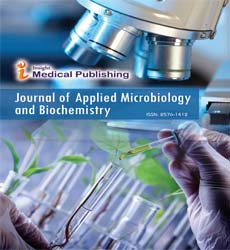ISSN : ISSN: 2576-1412
Journal of Applied Microbiology and Biochemistry
The Objective of Bioinformatics is to Integrate Data to Understand Biological Systems
Sara Leary*
Department of Molecular Medicine, Iran University of Medical Sciences, Tehran, Iran
- *Corresponding Author:
- Sara Leary
Department of Molecular Medicine, Iran University of Medical Sciences, Tehran,
Iran,
E-mail: learysara@outlook.com
Received date: May 04, 2024, Manuscript No. IPJAMB-24-19272; Editor assigned date: May 07, 2024, PreQC No. IPJAMB-24-19272 (PQ); Reviewed date: May 21, 2024, QC No. IPJAMB-24-19272; Revised date: May 28, 2024, Manuscript No. IPJAMB-24-19272 (R); Published date: June 04, 2024, DOI: 10.36648/2576-1412.8.3.223
Citation: Leary S (2024) The Objective of Bioinformatics is to Integrate Data to Understand Biological Systems. J Appl Microbiol Biochem Vol. 8 No. 3:223.
Description
Applied biochemistry is a field at the intersection of biology and chemistry, focusing on the application of biochemical principles to solve problems. It encompasses to variety a wide range of topics, from understanding cellular processes to developing new drugs and treatments. This discipline plays a vital role in various industries such as pharmaceuticals, agriculture, food science, and environmental science, contributing to advancements that improve human health and quality of life. Applied biochemistry is a dynamic and inter disciplinary field that harnesses biochemical principles to address global challenges in health, agriculture, environment, and energy. Through modern research and technological advancements, biochemists contribute to the development of new therapies, sustainable agricultural practices, environmental remediation strategies, and renewable energy solutions. As our understanding of biochemical processes continues to expand, the impact of applied biochemistry on society is poised to grow, shaping a healthier, more sustainable future for generations to come.
Applications of biochemistry
In pharmaceuticals, applied biochemistry is pivotal in drug discovery and development. Biochemists study the molecular mechanisms of diseases at a biochemical level, identifying potential drug targets and designing molecules to interact with these targets. This process involves techniques such as highthroughput screening, where thousands of compounds are tested for their biological activity against specific targets. Once a promising drug candidate is identified, biochemists further optimize its efficacy, safety, and bioavailability through rigorous biochemical analysis and testing. Enzyme technology is another significant area within applied biochemistry. In industries such as food processing and detergents, enzymes are used to improve efficiency and reduce environmental impact.
Biochemists engineer enzymes to perform specific functions under industrial conditions, enhancing their stability, substrate specificity, and resistance to inhibitors. This process, known as protein engineering, relies on bioinformatic tools and structural biology techniques to predict and modify enzyme properties. Biochemists develop crop varieties with enhanced nutritional content, resistance to pests and diseases, and tolerance to environmental stresses such as drought and salinity. Plant metabolism to improve agricultural practices, such as optimizing fertilizer use and reducing chemical inputs.
Additionally, biotechnological advances in agricultural biochemistry include the development of Genetically Modified Organisms (GMOs) with beneficial traits, sparking debates about their safety and ethical implications. Environmental biochemistry focuses on understanding the impact of pollutant on ecosystems and developing bioremediation strategies to clean up contaminated sites. Biochemists investigate how microorganisms degrade pollutants through biochemical pathways, offering sustainable solutions to environmental pollution. They also study the biochemical processes involved in carbon and nitrogen cycling, contributing to efforts to mitigate climate change and conserve biodiversity.
In the department of biotechnology, applied biochemistry drives revolution in biofuels and renewable energy. Biochemists explore alternative sources of energy derived from biological materials such as algae, bacteria, and agricultural waste. They optimize biochemical pathways for the production of biofuels like ethanol and biodiesel, aiming to reduce dependence on fossil fuels and mitigate greenhouse gas emissions. Moreover, biochemists investigate microbial electrochemistry and synthetic biology to develop microbial fuel cells and biosensors for environmental monitoring.
Integration of bioinformatics
The integration of bioinformatics with applied biochemistry has revolutionized biological research and industry. Bioinformatics combines biology, computer science, and information technology to analyze large datasets of biological information, such as DNA sequences and protein structures. Bioinformatic tools enable biochemists to predict the function of genes and proteins, design experiments, and model complex biological systems. This interdisciplinary approach accelerates drug discovery, enzyme engineering, and personalized medicine, paving the way for precision healthcare tailored to individual genetic profiles. Ethical considerations are integral to the practice of applied biochemistry.
Bioethicists collaborate with biochemists to address ethical dilemmas related to the use of biotechnologies in medicine, agriculture, and environmental conservation. Discussions on informed consent, equity in access to biotechnological innovations, and the potential risks of genetic manipulation inform regulatory frameworks and policies governing the ethical conduct of biochemistry research and applications. One of the fundamental aspects of applied biochemistry is the study of metabolic pathways within cells. These reactions involve the transformation of molecules to generate energy or to synthesize essential biomolecules such as proteins, carbohydrates, and lipids. By understanding these pathways, biochemists can manipulate cellular metabolism to produce valuable compounds like pharmaceuticals or biofuels.
Open Access Journals
- Aquaculture & Veterinary Science
- Chemistry & Chemical Sciences
- Clinical Sciences
- Engineering
- General Science
- Genetics & Molecular Biology
- Health Care & Nursing
- Immunology & Microbiology
- Materials Science
- Mathematics & Physics
- Medical Sciences
- Neurology & Psychiatry
- Oncology & Cancer Science
- Pharmaceutical Sciences
